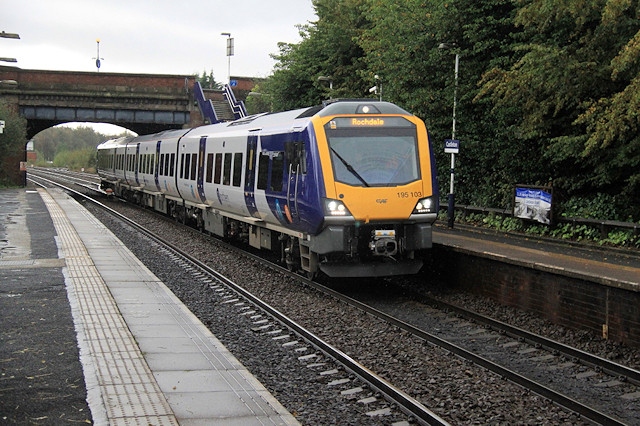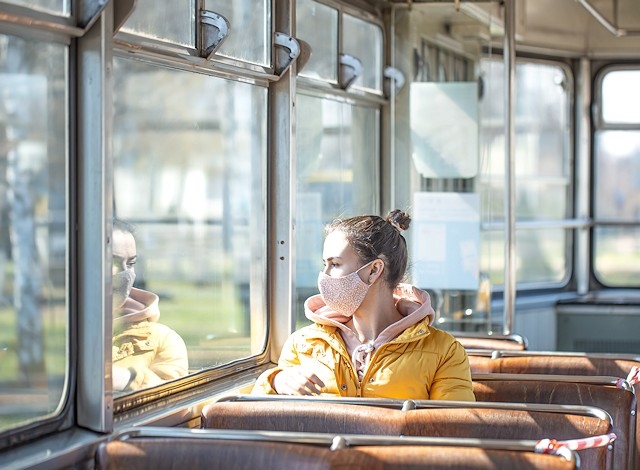Face coverings mandatory on public transport from 15 June
Date published: 05 June 2020

Photo: Russell Clarke
All passengers travelling on buses, coaches, trains, trams, ferries and aircraft should wear a face covering
From Monday 15 June, it will be mandatory for commuters to wear face coverings when using public transport in England, the Transport Secretary Grant Shapps has announced.
Face coverings include scarves or bandanas, not medical grade PPE masks to ensure availability for frontline staff. Last month, the government set out advice for people on how to make their own face coverings easily at home, using scarves or other textile items. These face coverings should cover the mouth and nose while allowing the wearer to breathe comfortably and can be as simple as a scarf or bandana that ties behind the head to give a snug fit.
People should wash their hands or use hand sanitiser before putting their face covering on and after taking it off; and it is important that people don’t touch their face covering when wearing it, where possible, to avoid hand-to-mask transmission of the virus.
Wherever possible people should continue to avoid public transport and walk, cycle or drive, but for some people this may not be an option.
When using public transport, people may be more likely to be in enclosed spaces for longer periods of time where there is a greater risk of the spread of the virus and social distancing is likely to be difficult to follow consistently.
Speaking at the Downing Street coronavirus briefing, Grant Shapps confirmed the government is asking operators to introduce face coverings as a requirement for travel from 15 June 2020. The government will also work closely with the transport industry to help them implement the plans.
The changes will be made under legislation such as the National Rail Conditions of Travel and Public Service Vehicle Regulations for buses. While the government expects the vast majority of people to comply with the changes, operators will be able to refuse travel or issue penalty fines for those who fail to wear a face covering, in a similar way to the rules on having a ticket for travel.

British Transport Police will also support the implementation of these changes.
Social distancing and hand washing remain by far the most important disease prevention measures but it is also vital all passengers travelling on buses, coaches, trains, trams, ferries and aircraft should wear a face covering and the government will also work with operators to ensure staff are provided with, and wear face coverings, where appropriate for their role.
Transport Secretary Grant Shapps said: “People should continue to avoid public transport wherever possible. But, as restrictions are carefully eased when it is safe to do so, it’s likely that we will see more people needing to use public transport.
“So, while respecting social distancing and maintaining good hand hygiene remain the most important steps we can all take to stay safe, wearing a face covering can play a role in helping us to protect each other.
“This is about the small changes we can take to help control the virus, which is why I urge everyone using transport to wear a face covering, to help keep us all safer.”
The advice suggests that, although face coverings are unlikely to prevent an individual from catching the coronavirus, they can help prevent someone who is infected from infecting others and therefore help control the virus.
The only exceptions are young children, people with breathing difficulties and people whose disabilities makes it difficult for them to wear a face covering.
The latest figures show that, since the start of May, between seven and 12 per cent of passengers on Metrolink have been observed wearing a face mask.
Mayor of Greater Manchester, Andy Burnham, said: “The mandating of face coverings on public transport is something we’ve been pushing for in Greater Manchester and I’m pleased the Government has moved to make it compulsory from 15 June.
“We’ve seen a gradual increase in the numbers of people using public transport since lockdown measures were eased, but the numbers of those wearing face coverings has remained relatively low.
“While we continue to discourage public transport use for anything other than essential journeys, we know more people will start needing to use our region’s buses, trains and trams over the coming days and weeks.
“We’ve got a collective responsibility to do what we can to help stop the spread of this virus, and wearing a face covering is not only a practical step we can take, it is something we know the public want to see* and will help to assure them that it is safe to use our public transport system.
“Over the next few days, we’ll be working with Transport for Greater Manchester, operators and the police to understand how this can be implemented in a safe and effective way.”
TfGM Customer Director Stephen Rhodes said: “We understand that people will have more questions about this and I’d like to reassure everyone that we are working with the Government as well as our partners and transport operators to ensure the policy is as clear as possible before 15 June.
“It’s important to add that wearing a face covering doesn’t replace existing social distancing measures. You should still keep a distance of 2m apart from other passengers while waiting for your service and on-board where possible.
“You should also wash your hands before and after your journey, use a tissue if you need to cough or sneeze, and using contactless payment if you can. If possible, carry a hand sanitiser with you.”
Do you have a story for us?
Let us know by emailing news@rochdaleonline.co.uk
All contact will be treated in confidence.
Most Viewed News Stories
- 1Newhey's Char Steakhouse and Bank Chamber close with immediate effect
- 2Six men arrested in Rochdale child exploitation investigation
- 3Royton haulage firm fined after Rochdale dad went to work and didn’t come home
- 4Two men arrested after police chase ends up in Middleton river
- 5Obituary: Jean Ashworth
To contact the Rochdale Online news desk, email news@rochdaleonline.co.uk or visit our news submission page.
To get the latest news on your desktop or mobile, follow Rochdale Online on Twitter and Facebook.


